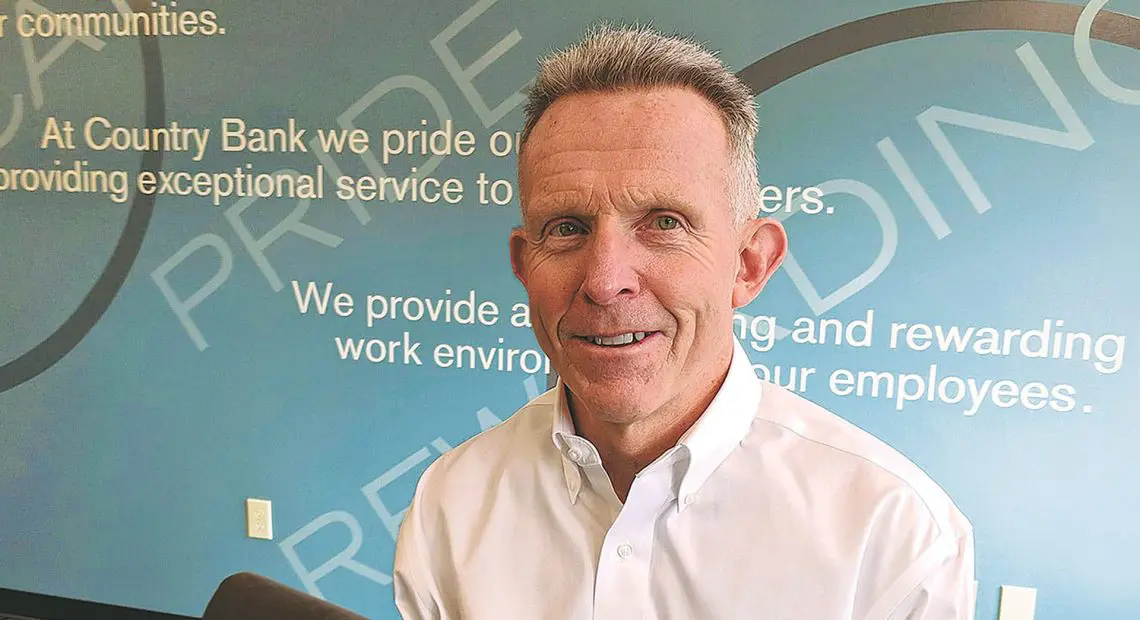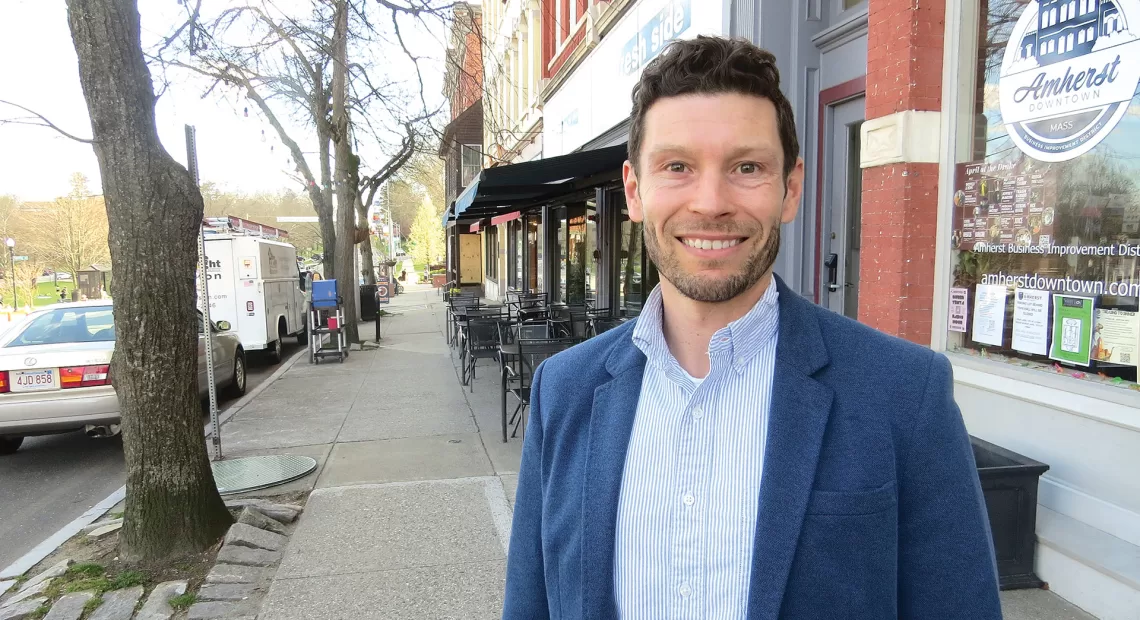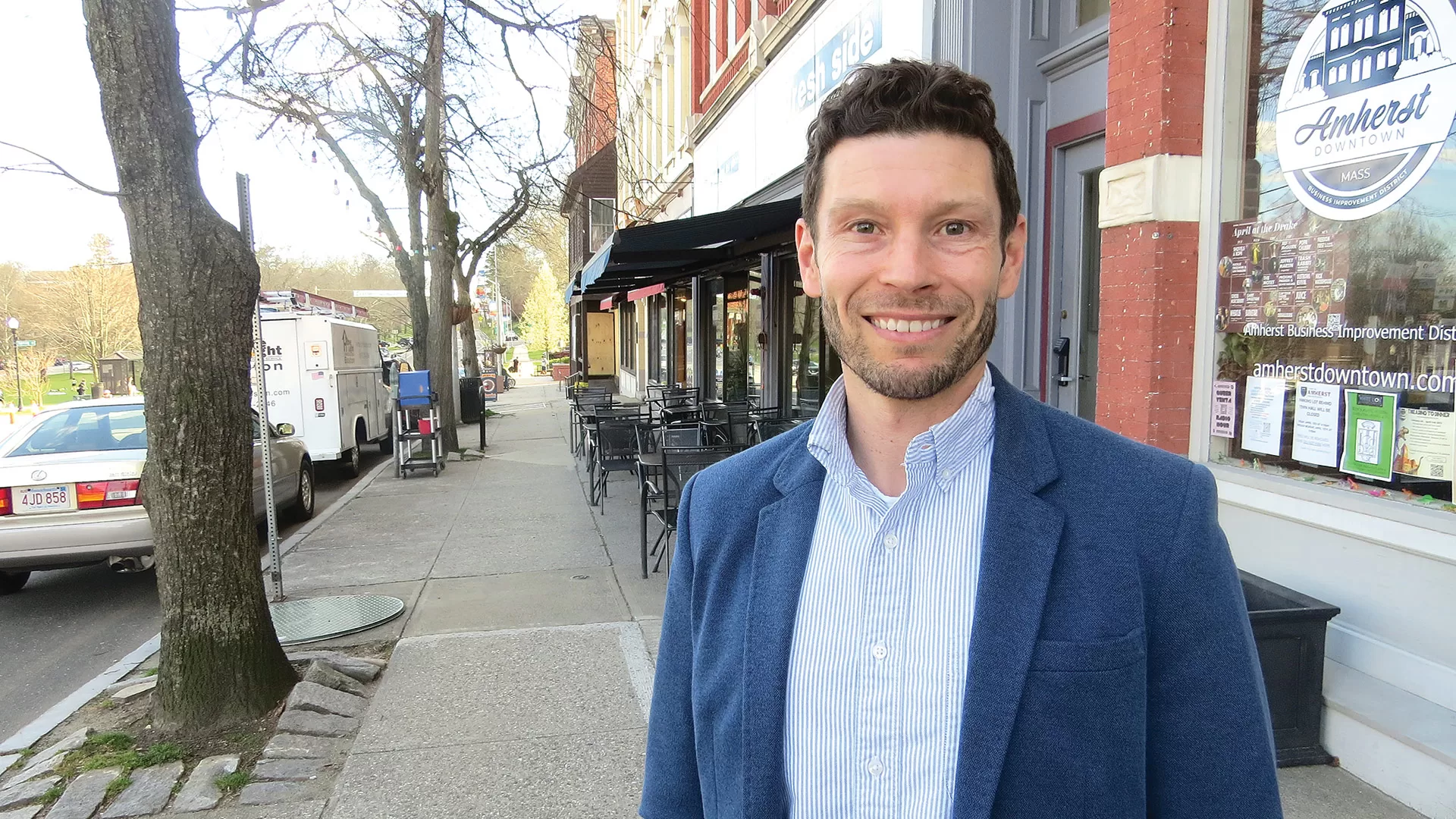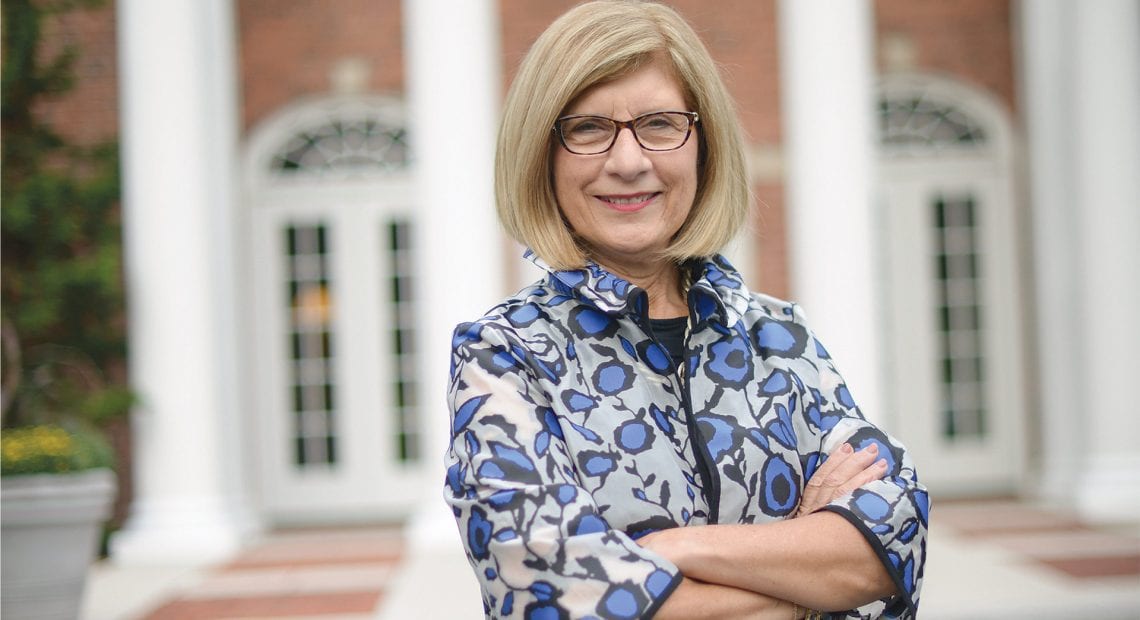Looking Back, Looking Ahead
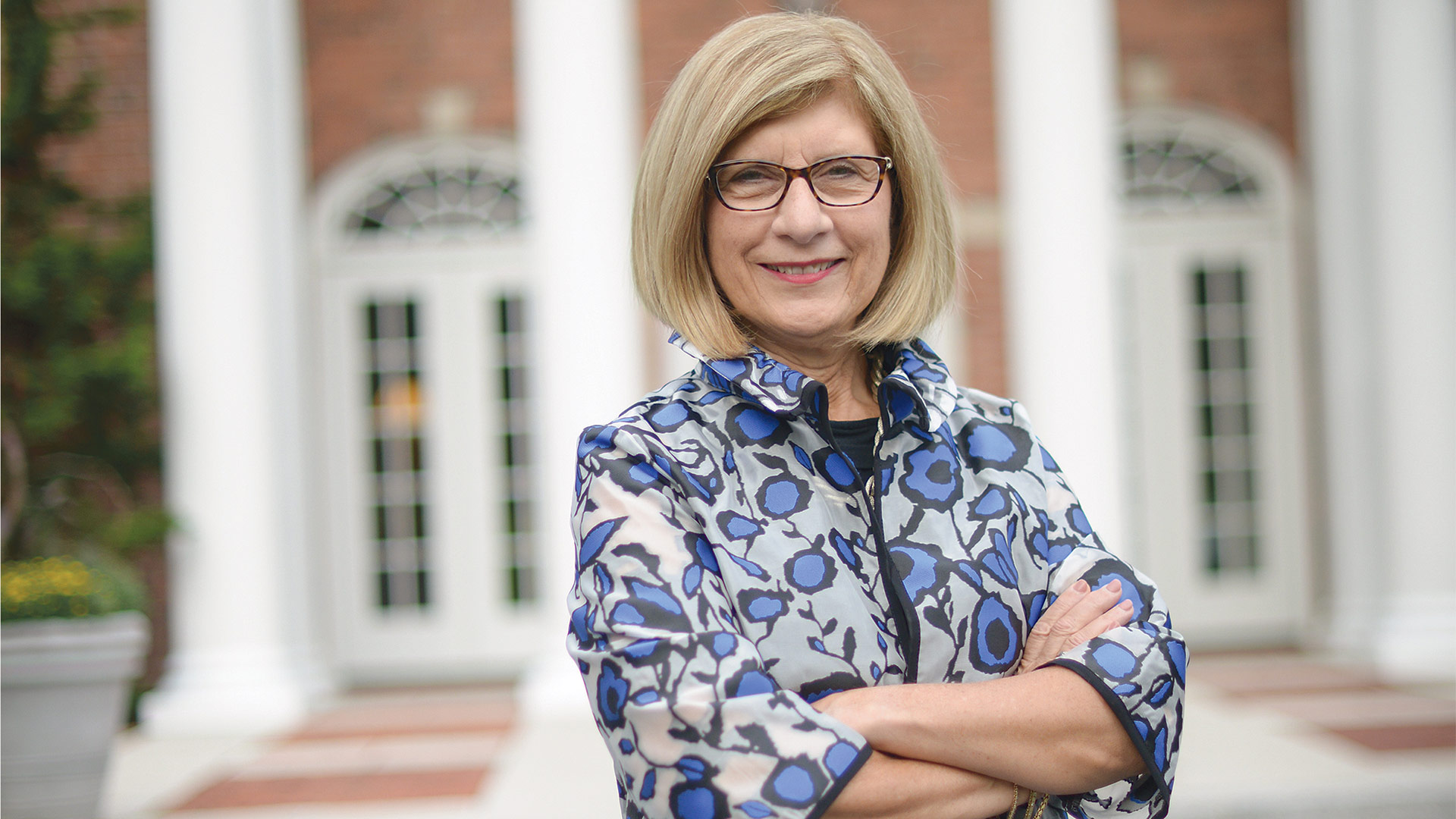
Carol Leary
Since arriving at the campus of Bay Path College in 1994, Carol Leary has always had her focus on what the future of higher education would — or should — look like, and positioning the institution for that day. As she prepares to retire in late June, she still has her eye on the future. She predicts that careers — and college programs to prepare people for them — will look much different years down the road, and institutions must be open to changing how they do business.
Carol Leary says she found the photo as she commenced the still-ongoing task of essentially packing up after a remarkable 26-year career as the president of Bay Path University — only it wasn’t a university when she arrived, as we all know.
It’s a shot of herself with former Secretary of Labor and Secretary of Transportation Elizabeth Dole — one of the first keynoters at the school’s Women’s Leadership Conference — and Caron Hobin, an administrator at Bay Path who back then had the title of dean of Continuing Education, and is now vice president of Strategic Alliances, a role we’ll hear more about later.
Since finding it on a shelf not far from her first edition of Bay Path Crossroads, the school’s admissions magazine (which also features Dole on the cover), Leary has been showing this photo to pretty much everyone who ventures into her office.
“It brings back so many memories — and it was the beginning,” she said, adding that it has become her favorite photo, not just because she and others can marvel at how much younger she and Hobin were back when it was taken, but because of the way it makes her pause and think about everything that has happened since it was snapped.
It is quite a list — from that aforementioned progression to a university to its dramatic growth; from the addition of baccalaureate, then master’s, and finally doctoral degrees to the creation of the American Women’s College, the first all-women, all-online baccalaureate program in the nation; from the opening of a new science center to national recognition is such fields as cybersecurity. And it is certainly worth dwelling on all those accomplishments.
Leary has certainly been doing some of that over the past several weeks as she winds down her tenure and anticipates the beginning of retirement in late June, especially as she finds more artifacts as she starts to pack up her belongings. But not too much, as her time has been consumed with everything from welcoming her successor — Sandra Doran was introduced to the campus community in late February — to dealing with the many effects of coronavirus, which has hit the higher-education sector extremely hard.
And while the latter is now dominating the final weeks of her tenure, with decisions to be made about events, classes, and more, Leary spent much of her time this winter not looking back, but looking ahead to the future of higher education and how schools like Bay Path can prepare for, and be on the cutting edge of, what should be profound change.
In most respects, this is merely a continuation of what she’s been doing since arrived at the Longmeadow campus in the fall of 1994.
“Colleges are facing some incredible headwinds,” she said. “And beginning a year ago, at each executive committee meeting of the board, I started sharing some of those challenges and opportunities facing not only Bay Path but all colleges and universities.”
When asked to elaborate on these headwinds, she started with demographics, especially those concerning the size of high-school graduating classes. “The number of 18-year-olds is dropping dramatically in this country, and that won’t turn around unless immigration is opened up and you get a flood of immigrants,” she explained. “All colleges are facing it, so what do you do?”
Many schools are shifting their focus to graduate degrees and adult students, and Bay Path was somewhat ahead of this curve when it started added such programs 20 years ago, Leary said, adding quickly that, while such steps have worked, schools can’t depend on them moving forward.
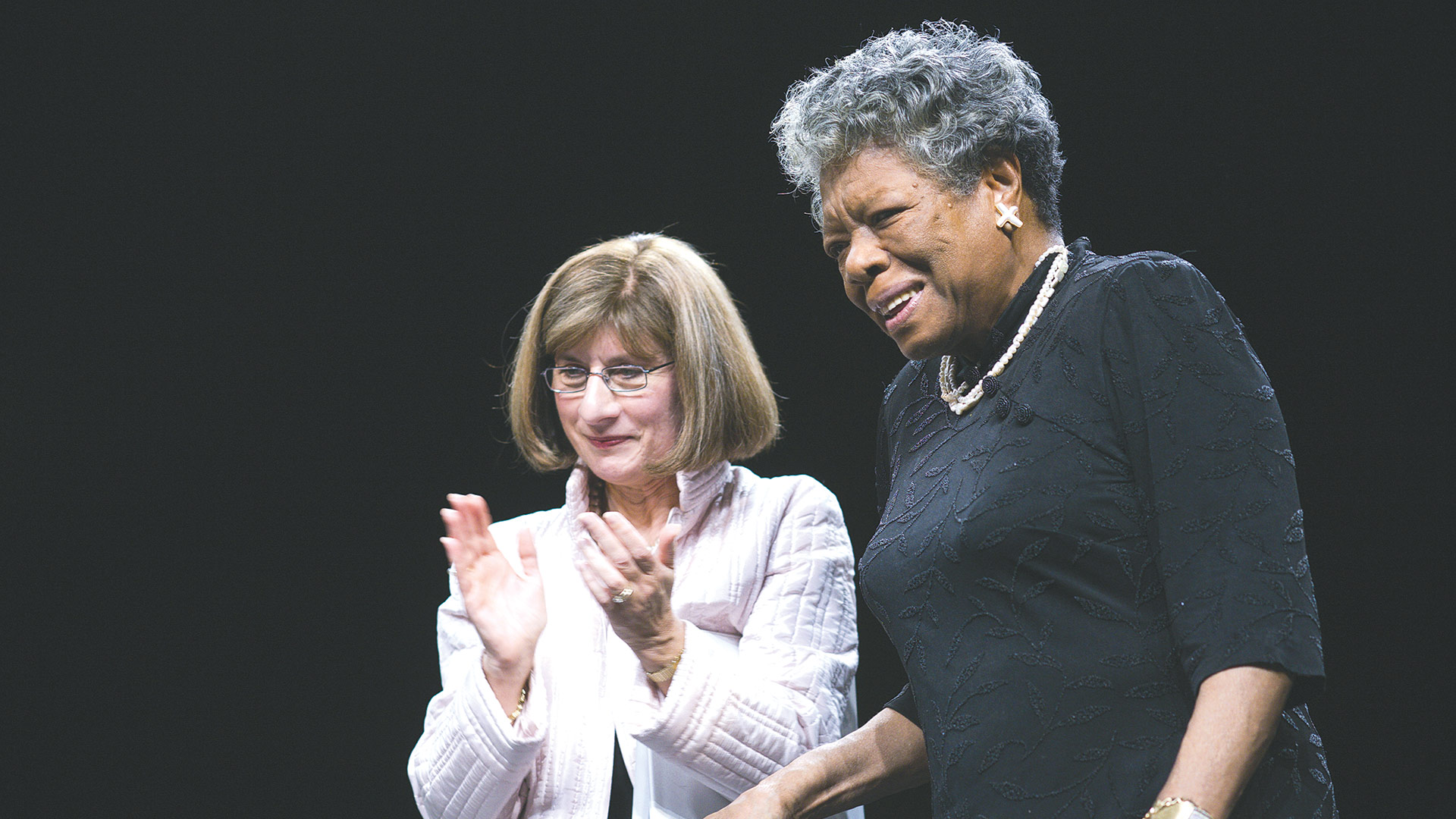
Carol Leary, seen here introducing poet Maya Angelou at one of Bay Path’s Women’s Leadership Conferences, has led the school through a period of unprecedented growth and expansion.
“There are now many more competitors — everyone is adding new programs,” she went on, noting that this is true of both adult (non-traditional) programs and online education, another arena where Bay Path was a pioneer. “As more schools enter the marketplace, that increases your competition, and then pricing gets driven down.”
There are many other headwinds, especially the soaring cost of higher education and the ways in which students will learn, she said, adding that it is incumbent upon all schools to try to get ahead of these issues and respond proactively, rather than react when it is perhaps too late.
This is the mindset she took to Bay Path back in 1994, and it’s the one she’s leaving with the board and her staff as she packs up those photos and other memory-triggering artifacts from a career with a number of milestones.
For this issue and its focus on education, training, and employment, BusinessWest talked at length with Leary. It was supposed to be to flip through a figurative photo album assembled over a quarter-century, but, in keeping with her character, she was much more focused on the future than the past.
Developing Story
As noted, that photo of Leary with Dole and Hobin triggers a number of memories — and stories, which lead to even more stories.
One that Leary likes to tell involves how Dole’s presence at the conference helped lead to another keynoter of note — Margaret Thatcher.
“People ask how we accomplished what we did, and I always said the number-one reason was that I hired very committed, very passionate, and very smart people. And that is the secret sauce — who you hire. I give them all the credit.”
“She [Dole] had an advance person, a young man maybe 25 years old, and I’m in the wings with him listening to her speak, and he said, ‘who else would you like to have?’” she recalled. “I said, ‘we don’t have the first woman president of the United States yet, so I’d love the first woman prime minister of Great Britain.’ And he said, ‘my mother is her advance person.’”
Fast-forwarding a little, she said arrangements were made for Leary and Hobin to fly to Washington and deliver the invitation to Thatcher personally. She eventually came to downtown Springfield in the spring of 1998, thus adding her name to a lengthy list of keynoters that also includes Maya Angelou, Jane Fonda, Madeleine Albright, Rita Moreno, Queen Latifah, and many others.
There are stories — and photos — involving all those individuals, said Leary, who got to spend some time with each one of them.
But while she loves to tell those stories, an even more pleasant assignment is talking about the women, many of them first-generation college students, who have come to the Bay Path campus over the past quarter-century. Creating opportunities for them has been the most significant accomplishment of her career, she said, adding that her tenure has in many ways been defined by the small framed copy of that quote attributed to Steve Jobs — “The ones who are crazy enough to think they can change the world usually do” — she keeps near her desk.
“I don’t even know if he actually said that, but they say he said it,” she noted with a laugh. “Anyway, I always tell people that’s how we have to look at every issue.”
And that mindset has led to a stunning transformation of the 123-year-old school, which was a secretarial school decades ago and a sleepy two-year school when she and her husband, Noel, first visited it after she was recruited to apply to be its fifth president.
By now, most know the story. While many of their friends and family were dubious about this small school as her next career stop after working for several years at Simmons College (another women’s school), the Learys didn’t have any doubts.
But nothing about the turnaround effort — and it has to be called that — was quick or easy. And all the efforts were the result of teamwork, said Leary, who, over the years, has said repeatedly that the success of the institution is not due to one person, but rather a large and talented team.
“People ask how we accomplished what we did, and I always said the number-one reason was that I hired very committed, very passionate, and very smart people,” she said. “And that is the secret sauce — who you hire. I give them all the credit.”
While finding old photographs and items like that issue of Crossroads, Leary has also come across some of the letters (yes, she kept them) from institutions trying to recruit her and headhunters asking to apply for positions. More than the letters themselves, she remembers how she replied to them.
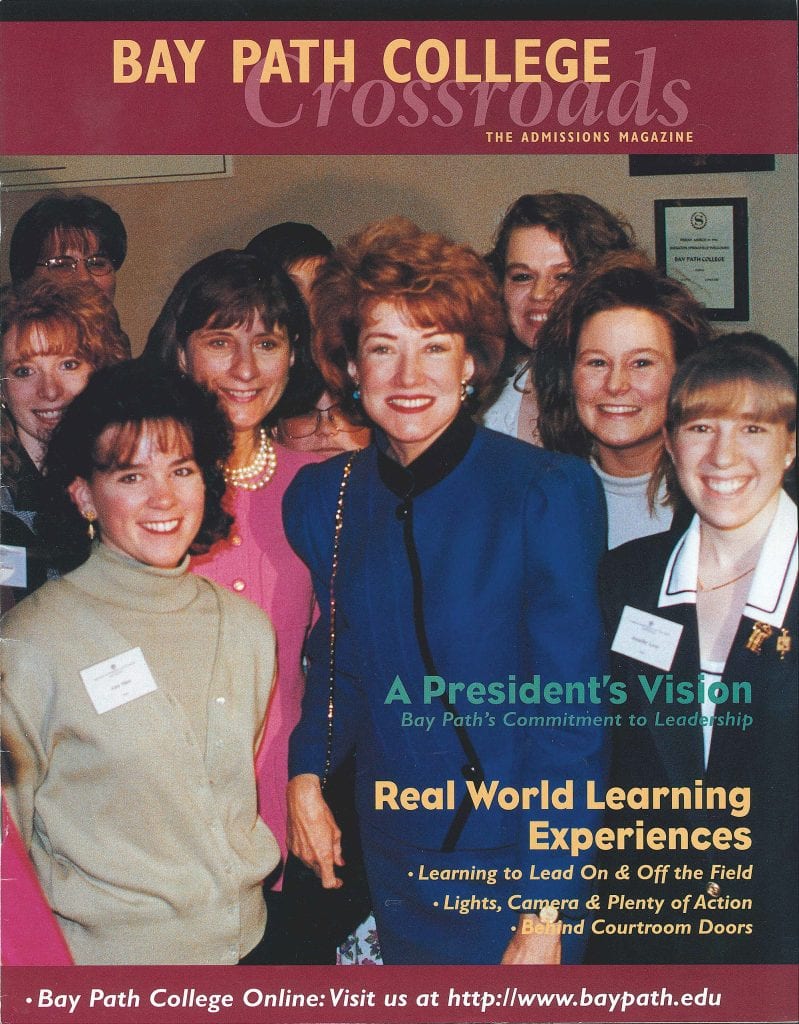
This copy of Bay Path College Crossroads, with Elizabeth Dole on the cover, is one of many poignant pieces of memorabilia Carol Leary has come across while packing up after her remarkable career at the school.
“I always said, ‘my work here isn’t done — I’m in the middle of this vision or that vision,’” she recalled. “I never had the yearning to go anywhere.”
The work was never done because the school was seemingly always in a state of transition — first from a two-year school to the baccalaureate level, then to the master’s level, and then online and the introduction of new healthcare programs, and then doctorate programs.
And because it needs to, the school is still transitioning.
School of Thought
As she talked with BusinessWest a few weeks ago, Leary was splitting her time a number of different ways — although coronavirus had certainly seized most of it as this article was being written, including the postponement of the annual Women’s Leadership Conference, which had been set for March 27 at the MassMutual Center. Meanwhile, there are several retirement parties scheduled, as well as the annual President’s Gala, a huge fundraiser for the university and, specifically, the President’s Scholarships established by Leary to assist first-generation students. Those are still proceeding as scheduled, although the virus and the response to it is a story that changes quickly.
What won’t be changing quickly — in speed or direction — are those headwinds facing seemingly all the most prestigious colleges and universities.
And the most pressing issue, she told BusinessWest, is doing something about the high cost of a college education.
“As higher-education professionals, we have to figure out how to deliver our model in an affordable way so that families can send their children and adults can attend as well and not have high debt,” she explained. “That’s why the American Women’s College was created in 2013, but it is not going to be unique anymore because, as the number of 18-year-olds goes down, colleges have to think about other sources of revenue.”
With this in mind, Leary said Bay Path long ago started looking at new strategies for growth and creating learning opportunities. And it has created a new division, the Office of Strategic Alliances — Hobin now leads it — which is focused on non-credit work and professional development.
“We’re thinking not necessarily about a student coming to us, graduating in four years, and maybe getting a graduate degree, but more in terms of ‘what do we need to do to educate that student through her life cycle,” Leary explained, pointing, with emphasis, to a report she’s seen indicating that a child born today has the potential to live to 150 years.
“If you think about that, they may have an 80-year work life,” she went on. “And so, the college degree they earn at age 22 may not be relevant at age 60, 70, or even 80; a child today will have a longer work life, and it will be a much different work life than what people are experiencing today.
“I can’t even predict what it will be like, but colleges have to stay relevant,” she said, adding that Bay Path’s new division will handle professional development for businesses that want to retool and retrain their workforces. “That’s probably the future; that’s where we need to be — not just offering degrees but also offering lifelong learning opportunities.”
In that future, which is probably not far down the road, Leary projects that higher education will be “unbundled,” as she put it, into degrees but also short- and long-term programs, and with students not necessarily spending four years at one institution, but rather moving in and out of a school.
“This is going to shake up my colleagues in the field, but if I had a crystal ball … I don’t think students are going to come to one college and stay there for 120 credits,” she explained, summoning the acronym CLEP, or college-level examination program, which enables individuals with prior knowledge in a college course subject to earn college credits by passing an exam, thus possibly earning a degree more efficiently and inexpensively.
“I always said, ‘my work here isn’t done — I’m in the middle of this vision or that vision.’ I never had the yearning to go anywhere.”
“We already see students coming and going, bringing in community college and other college credits, CLEP, advanced placement, and more,” she went on. Meanwhile, adults don’t some in expecting to take 120 credits because somewhere in their life they may have taken a year somewhere and then life happened and they dropped out.
“Overall, colleges are going to have to reflect on what is learning, how does learning place, where does it take place, and how does it fit it into a credential like a degree; I don’t believe that degrees are going to be place-bound,” she said in conclusion, adding that such reflection must lead to often-profound change in how things are done.
And higher education is not exactly noted for its willingness to change, she said, adding that this sentiment must shift if the smaller institutions want to not only survive but thrive.
Future Course
As noted, Leary will be staying on until late June, and between now and then she has to move out of her home on campus and pack up everything in her office, including a number of awards she’s received from organizations ranging from the Girl Scouts to BusinessWest; she’s actually won two honors from this magazine — its Difference Makers award and its Women of Impact award.
She’s also planned out the first several months of retirement, with several trips scheduled — to England in July and Italy in August, if coronavirus doesn’t get in the way — and work on two boards in Ogunquit, Maine, where she will spend roughly half the year, with the other half in Fort Lauderdale. She even has a T-shirt that reads, “Yes, I have a plan for retirement.”
As for the school she’s leaving … it’s a much different, much better, and much more resilient institution than the one she found a quarter-century ago. She insists that people shouldn’t credit her for that. Instead, they should maybe credit Steve Jobs and that quote attributed to him.
Leary didn’t set out to change the world, necessarily, just that small bit of it off Longmeadow Street. To say she did so would be a huge understatement, and in the course of doing so, she changed countless lives in the process.
George O’Brien can be reached at [email protected]



